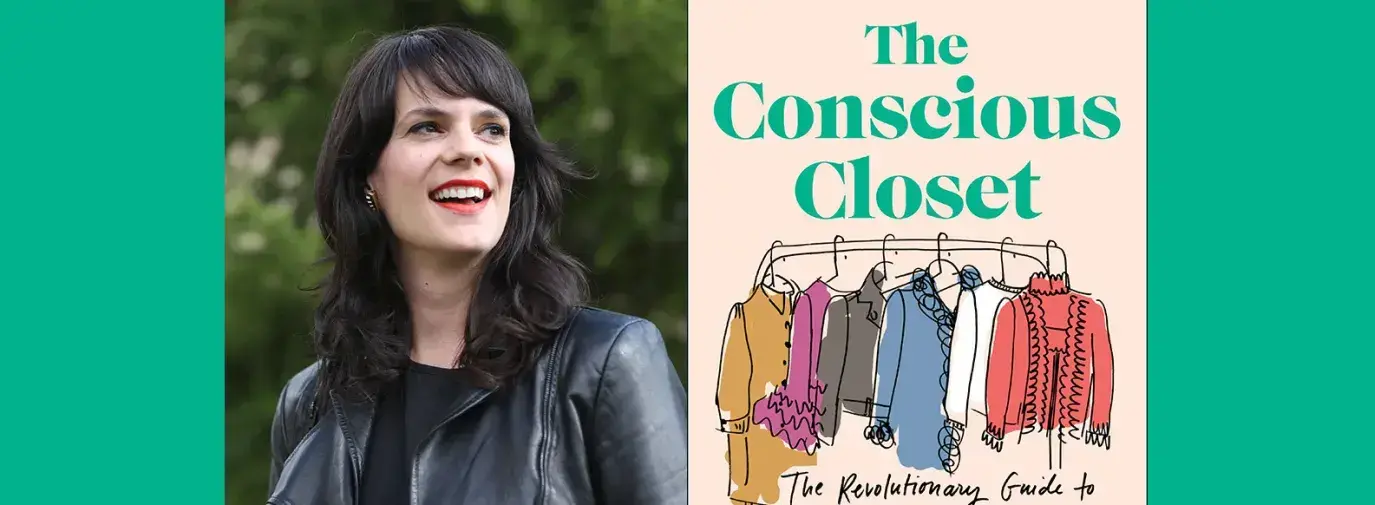
As I began research for the Unraveling Fashion issue, I was able to get the first copy of Elizabeth L. Cline’s new book, The Conscious Closet (Plume, 2019), from my public library. The book is a practical guide to making your closet more ethical and sustainable, by giving tips on looking for quality when shopping, mending instructions, and how to define your tastes to reduce your fashion needs to begin with.
Cline’s first book, Overdressed (Portfolio, 2012), helped document the fast fashion industry and brought new attention to the ethical fashion movement in 2012, just before the Rana Plaza disaster. The journalist and now garment waste expert has seen the movement continue to grow. In our interview, she shared what gets her out of a rut when she gets discouraged and why she wrote the book to be gentle and welcoming.
Eleanor Greene / Green America: You spoke to Terry Gross on Fresh Air in 2013 and said you were 100 percent convinced the Rana Plaza tragedy was the turning point in the sustainable consumption of fashion. Six years later, do you think that was true?
Elizabeth Cline: It absolutely was a pivotal moment. I think that was when the conscious fashion movement was born really. There had been people working on this issue for a long time, but that was when is really coalesced to a global movement. I think that the climate change conversation has also kind of pushed sustainable fashion further, too. So that would be the second inflection point giving this movement its wings. But Rana Plaza was it was a turning point for sure.
Eleanor Greene / Green America: How have you seen people take action and things change?
Elizabeth Cline: There are now probably two dozen NGOs dedicated towards fashion sustainability and fashion ethics. Fashion Revolution [founded in 2013] is one of the organizations that has galvanized literally millions of citizens around the world, to call for greater environmental responsibility and social responsibility and discussions. The United Nations has convened summit on sustainability and fashion. It's on the political agenda in the UK, and France, Germany, and all over Europe.
If I go back in time, when Overdressed came out, like I would go to meetings about the sociopolitical state of the fashion industry, and there would be 20 people in the room. And now it's a global movement of, literally millions of people.
And I do think that aside from the fact that the social movement part of it is very strong, I do feel like that conversation has gone mainstream. Mainstream media covers sustainable fashion, pretty regularly, the fashion press covers it pretty regularly, and fashion brands themselves. That is probably the biggest change in the in the most unexpected change is like how quickly over the last say year or two years, more and more brands have come out with pretty impressive sustainability goals. I mean, they're not doing shit about wages, but nobody wants to destroy the planet because of climate change, and fashion brands are finally doing some really, really interesting things around changing their business models to meet our climate goals, which is amazing and surprising to me.
Eleanor Greene / Green America: You just mentioned companies not doing much about wages. I spoke with someone at the Fair World Project about the Fair Trade Certified label used by many brands not being very trustworthy, and I noticed you recommended it in your book, so I was wondering if you knew about that label being less good for workers and not supplying fair wages.
Elizabeth Cline: I would say that I would agree that we need more, third party, regulating certifications. The fashion industry could learn a lot from the food industry where there are reliable certifications and, guidances for consumers. When I was when I was writing the Conscious Closet, I was like, 'Here's what's available,' but also, in the back of my mind thinking like, 'we need more than this.' And we do need the support of the FCC and the EPA to sort through the claims that brands are making and communicate what, what's real and what's not to consumers. Because if it's difficult for me as a journalist, it's impossible for shoppers.
In the book I give the most real estate to talking about the fight for living wages, which has got to be the goal. It's not enough to give people a little bit extra, we're for, an organization to arbitrarily decide what is going to be paid. A living wage is based on the calculation of the cost of living in an area and it's also considered a human right, by, the International Labour Organization. I've heard these critiques of fair trade, too. For me, with the book, I wanted to make sure to cover everything that was out there.
I talked at length in the book about how few factories there are in the world that pay living wages, and how far we are really from having an ethical fashion industry. Especially right now in this specific moment there is a lot of there is a lot of political will organizing around worker rights after Rana Plaza. But because of the climate change movement which of course is crucial and necessary and so important in society, right now the focus is on sustainability. But we have to make sure we don't abandon the wider mission which is that ethics and sustainability have to go hand in hand, otherwise they're both meaningless.
Eleanor Greene / Green America: Absolutely, there’s a lot to the topic of fair trade. I’m about three quarters of the way through Conscious Closet right now and it feels like there could be an entire book for every chapter you cover. But Green America is absolutely on board that it has to be both good for the planet and good for people for an industry or product to be green.
Elizabeth Cline: Conscious Closet is really about broadening the audience for this movement because a lot of people feel guilty, like they're going to be shamed if they buy a shirt from H&M, or they buy something that was made in a sweatshop. But this is the system we’re in, and it's really difficult to feel like all of your choices are ethical and sustainable. That's also not the goal. The goal is to make the industry more responsible not to create these perfect, conscious consumers, it's more about using our consumer power to make broader change. The book is like very gentle and welcoming. I want people to feel included instead of scared away.
Eleanor Greene / Green America: When you get overwhelmed by the issues with fashion, what do you do to get out of that rut?
Elizabeth Cline: Climate week is such a good example of how I get inspired. Whenever you feel like you're participating and creating that new way of life like that, that that's really rewarding. And for me, it's like everything from when we have a mending party in Brooklyn, a clothing swap, a documentary screening, or a book club, or just when I hear about people meeting up in person to define was their sustainable and ethical existence looks like, that's so, so inspiring to me, because it's really the revolution of everyday life, that, the book is about, and that I think makes like such a big difference.
Like everybody else, I go through cycles of like, pessimism and optimism. But I think if you're a progressive person, it's just your instinct, to keep moving forward, because we do this because it's right. Even if sometimes we feel like, we're never going to reach the ultimate goal. You just have to keep going, because it is just what's right and ethical.
Eleanor Greene / Green America: What first sparked your interest in ethical and sustainable clothing?
Elizabeth Cline: For me does that all the way back to when I was in high school in the 90s and I, I just remember hearing about sweatshops for the first time and, companies like Gap and Old Navy using sweatshops. It was, for me just like a watershed moment, because I couldn't believe that companies that I thought were so cool, that were obviously powerful and had plenty of money, were also exploiting people in other places who were much more vulnerable than I was.
So that that was the moment for me, when I started to politicize when I realized that, I care about social justice about fairness. But Overdressed was inspired by also by how I fell into this habit of shopping for fast fashion. And I got really lured into buying trendy clothes and like getting the best price that I could. And I just thought it was interesting that even for someone like myself who was trying to be careful and socially aware when I shopped, even me, I just wanted to put the best deals. So that was kind of what fired, Overdressed was me wanting to find out like what was behind the rise of disposable fashion.
Eleanor Greene / Green America: From Conscious Closet, it seems like being ethical and sustainable is always on your mind when shopping now?
Elizabeth Cline: It becomes second nature. One of the things that gave me the confidence to write the book is the fact that it's not just me who consumes this way, it's a social movement of millions of people around the world, and everybody has kind of figured out what works. When I first started out, it was like, do I really have to buy, that two-hundred dollar organic, made in the US dress, is that my only choice? And then we all just figured out as a movement, like no, obviously, like, that's not the only choice.
You could shop secondhand, you can also shop your own closet, you can also buy whatever you want, and then just use your voice to communicate with your, your elected leaders and with brands. And then conscious shopping looks so many different ways. Because clothing is personal, but also, because people are coming into this movement from so many different, economic situations and phases in their life.
When I was buying a lot of fast fashion, it was because I was like working in an office in Manhattan and was supposed to look a certain way. But now I'm in my late 30s, I have a totally built out wardrobe, I love my clothes. And it took me a long time to build out my wardrobe. But that's one of the cool things about getting older, I've gotten to assemble the wardrobe that I always wanted. And I couldn't have had that when I was 25. But yeah it's got to be the strategy.
Eleanor Greene / Green America: I think our younger readers would be happy to hear there’s less pressure on them to do everything right. Because it sustainably made can be so expensive and sometimes it seems like those expensive products are the only way.
Elizabeth Cline: A sustainable product is the product that last a long time, people don't always want to hear that. But that's the truth.
We need to be working to extend the life clothing, especially in the United States. We have the most disposable clothing habits in the world, we wear clothes a quarter of the global average, and some consumers wear them as little as one time, like Instagram influencers or something. And it's just really, really bad for the environment. We buy one out of every five garments made in the world. If we know that fashion is responsible for eight to ten percent of carbon emissions, we know that like a large percentage portion of that is like on our shoulders as American consumers. The environmental side of it is connected our excess.
It's important to remind people that it's possible to live really well without buying so much. There's a lot of space in between how we live and consume as Americans and living like a monk. We must find that comfortable space in the middle, where we're still living well and dressing the way we want to and feeling good in our clothes. But also living within the boundaries of our planet.







